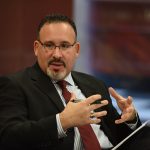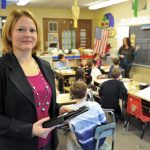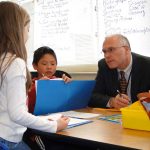Sandra M. Chafouleas, Board of Trustees Distinguished Professor and Neag Endowed Professor in the Department of Educational Psychology at the University of Connecticut, said experts are seeing an increase in concern about mental health and emotional well-being, especially among teenagers who may be missing opportunities to pursue interests, social connection and independence, at a time when communities are also facing serious economic and health impacts.
A program specialist for University Events and Conference Services at the University of Connecticut, alumna Anne Hill ’90 (CLAS), ’92 MA, has been planning events across campus for nearly 24 years. When the COVID-19 pandemic hit last spring, Hill and her team had to uproot the strategies they had been using to design in-person events and pivot to online platforms.
“I think it just revealed some of the deep inequities that have existed but didn’t really surface until it was forced to,” says Neag Professor of Educational Policy Casey Cobb. “So that was one of the main things that we’ve learned. I think a lot of schools adjusted very quickly and really made new efforts and creative efforts to keep contact with their families and their kids — with home visits in a safe manner and bringing food to families in need.”
President Joe Biden’s nominee for U.S. Secretary of Education, Neag School alumnus and Connecticut’s Education Commissioner Miguel Cardona ’01 MA, ’04 6th Year, ’11 Ed.D., ’12 ELP, was officially confirmed on March 1, 2021, by the U.S. Senate. He is the first UConn graduate in history to hold a Cabinet-level position in the White House.
Sandra Chafouleas, Board of Trustees Distinguished Professor and Neag Endowed Professor of educational psychology and founder of the Collaboratory on School and Child Health (CSCH), spoke with Julie Bartucca of the UConn 360 podcast about ways parents can support their children’s well-being during this time, as well as about how to talk to kids about the upheaval going on in the U.S.
“As science teacher educators committed to making science relevant to students’ lives and consequential in the pursuit of justice, we highlight how science intersects with society, especially how science is represented and made accessible through the media,” writes co-author Todd Campbell.
Nearly a year since the nation went into lockdown due to the COVID-19 pandemic, just about everyone is struggling to maintain a semblance of normality. Parents of school-aged children have taken to social media and countless news stories have been written on the difficulties of balancing remote learning with remote working.
“So, the interventions are usually either small groups or either individualized really focused, targeted instruction for the student to sort of catch them up and get them up to kind of speed an up to the standards for that grade level and for that age range, rather than whole cloth, you know retention. Do the whole grade again,” said Sarah Woulfin, Associate Professor at UConn Neag School of Education.
Why have suicide rates increased among teens in U.S. since the start of the COVID-19 Global Pandemic? A licensed psychologist and Neag School Board of Trustees Distinguished Professor, Sandra M. Chafouleas, joins us for a discussion and to share her thoughts on the mental health struggle of teenagers in schools.
Paul Freeman ’09 Ed.D. is in his 10thyear as the superintendent of Guilford (Conn.) Public Schools and has almost 30 years of administrative and teaching experience in schools in Connecticut. Freeman earned an Ed.D. in 2009 from the Neag School of Education. In addition to having recently been named the state’s Superintendent of the Year by the Connecticut Association of Public School Superintendents (CAPSS), he had been recognized in 2014 by the Neag School as Outstanding Superintendent of the Year.




